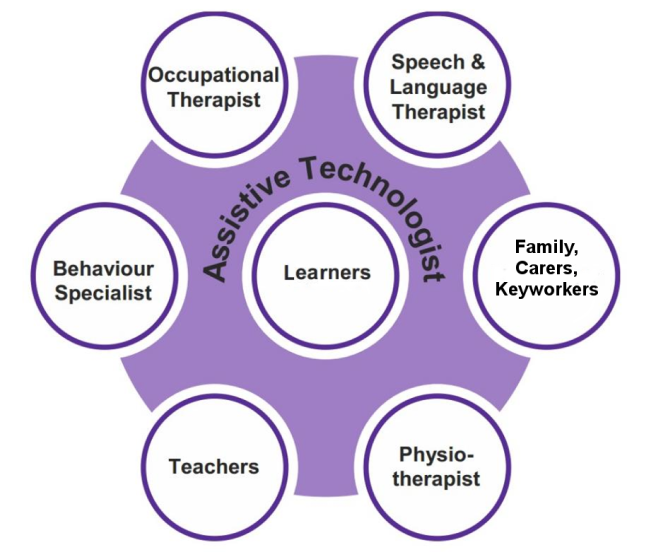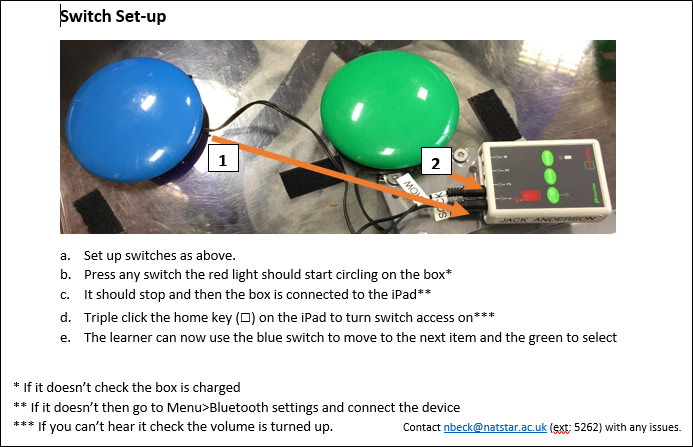“Assistive technology (AT) is any item, piece of equipment, software program, or product system that is used to increase, maintain, or improve the functional capabilities of persons with disabilities.”
(Source: Assistive Technology Industry Agency, https://www.atia.org/at-resources/what-is-at/)In terms of this project we are looking at high-tech solutions for those in a work or educational environment.
Assistive technology provision allows students to:
Allows students improved:

In this model the purple is where the Assistive Technologist works, they link the needs of the specialists and stakeholders with the technology that can help them achieve their wider goals
As part of the project we have created a draft profile(link here) to be considered by ESCO (European Skills Competences Qualifications and Occupations) in their 2021 update. ESCO is the multilingual classification of European Skills, Competences, Qualifications and Occupations. ESCO is part of the Europe 2020 strategy.
The ESCO classification identifies and categorises skills, competences, qualifications and occupations relevant for the EU labour market and education and training. It systematically shows the relationships between the different concepts.
An Assistive Technologist should have knowledge of supporting learners with disabilities, be able to problem solve to find solutions and have a good working knowledge of technology that can help fit these requirements.
They should understand enough about the specialisms they are working with (e.g. Speech and Language Therapy, Teaching, Occupational Therapy) to provide solutions in these different environments. Below is an example of a switch guide for a learner accessing technology in lessons:

People skills are very important as they must gain information about the learners they are working with whilst being able to differentiate their delivery depending on the needs of the learners.
A key part of their job is assessment, you can find out more about that under Assessment Models, you can also read about the type of technology they work with in the Case Studies, for the most common technology then read our case study on Everyday Assistive Technology
Here is an example job description
The Assistive Technologist role does not have as clear a progression as other professions. Assistive Technologists come from varying backgrounds: Teaching, Care, Occupational Therapy, Speech and Language Therapy and many more.
This is reflected in the lack of professional qualifications available, there are a few qualifications which specifically help with the role but many other beneficial qualifications that may complement an Assistive Technologist, often depending on what context they are working in.
Here are a few of the qualifications Assistive Technologists have used within the UK:
Level 7 Postgraduate Certificate in Assistive Technology.
Purpose: To enhance individual practice and extend knowledge and thinking in the field of Assistive Technology for communication and learning.
Participants: Professionals working with people with complex physical and communication disabilities
Learning: Two units completed over one or two years.
For the full award, students complete both units.
1. Assistive Technology to support communication and learning for people with physical and/or communication difficulties (30 credits)
This unit explores the use of Assistive Technology (AT) to support communication and learning. It considers an individual’s need for AT and critically reviews some of the available hardware and software solutions, and their implementation, with consideration of such issues as access, control, recording and retrieving information.
2. Augmentative and Alternative Communication (30 credits)
This unit explores the needs of people with complex communication difficulties and critically evaluates the available range of Assistive Technology resources and strategies, examining the issues of assessment, implementation, support and training.
Students will create and critically evaluate a communication resource for an individual, group of individuals, or for a service.
Link: https://acecentre.org.uk/services/training/#academic-qualifications
The SCQF Level 9 PDA Advancing Equality and Diversity through Inclusiveness, is validated by SQA and delivered by College Development Network (CDN).
The award comprises of a single mandatory unit: Analysing Equality, Diversity and Inclusiveness in Context (HH9J 36) and one double unit which can be selected from the following:
Option A - Practising Inclusiveness to Advance Equality & Diversity (HH9K 36)
Option B - Practising Inclusiveness through Needs-Led Assessment (HH9L 36)
This revised PDA has been designed to meet the CPD needs of a broad range of existing and new staff in the public sector in relation to complying with current equality legislation and embedding the legislative requirements within their day to day practice of supporting learners and staff from across the spectrum of all 9 Protected Characteristics including disability.
Link:
https://www.cdn.ac.uk/pda-advancing-equality-diversity-inclusiveness-deadline-date-fast-approaching/
Assistive Technologists work to improve access to learning or/and improving independence and participation for individuals with disabilities. They do this through learner support and staff support with activities such as assessments, training and guidance. They have a good understanding of learners’ needs and wide technology knowledge relevant to the learning, living or work context.
To see if and how this occupation is regulated in EU Member States, EEA countries or Switzerland please consult the Regulated Professions Database of the Commission. Regulated Professions Database:
http://ec.europa.eu/growth/single-market/services/free-movement-professionals/qualifications-recognition_en

"The European Commission support for the production of this publication does not constitute an endorsement of the contents which reflects the views only of the authors, and the Commission cannot be held responsible for any use which may be made of the information contained therein."